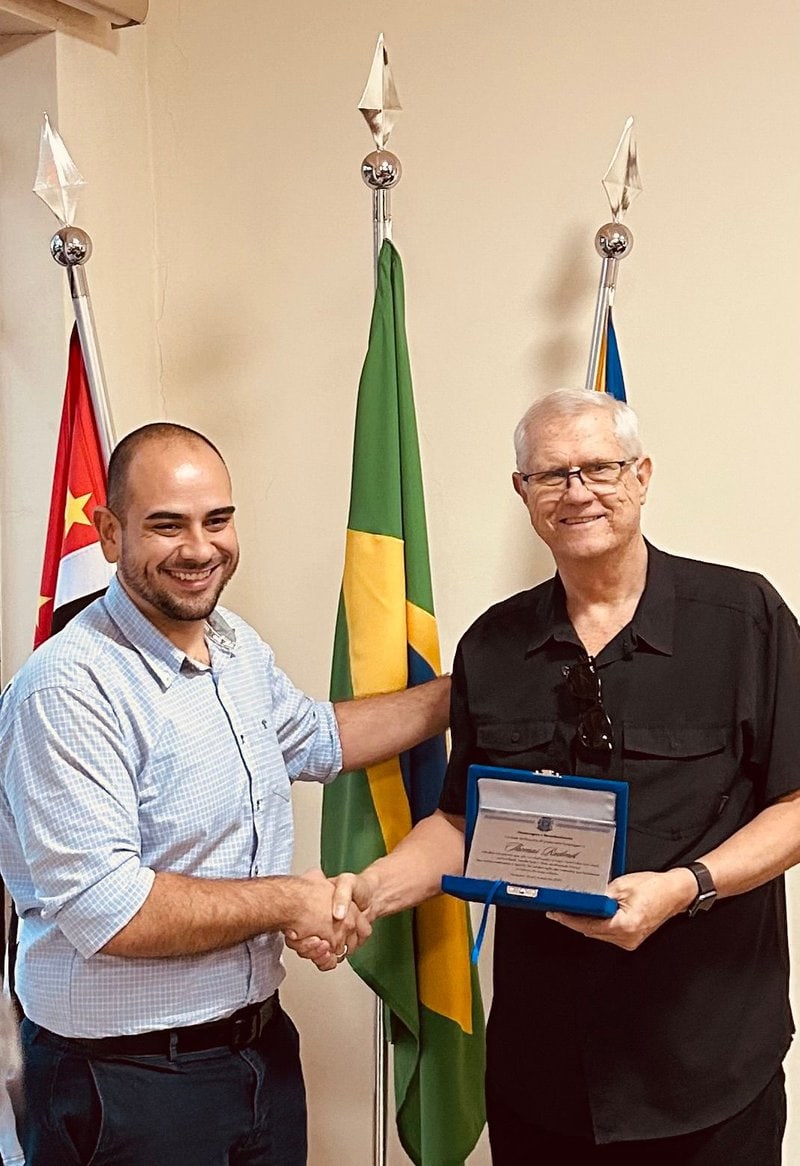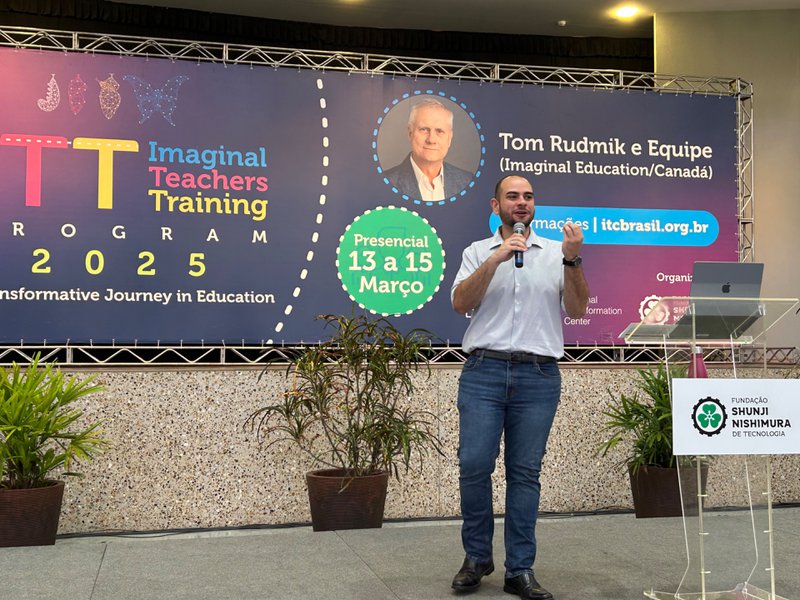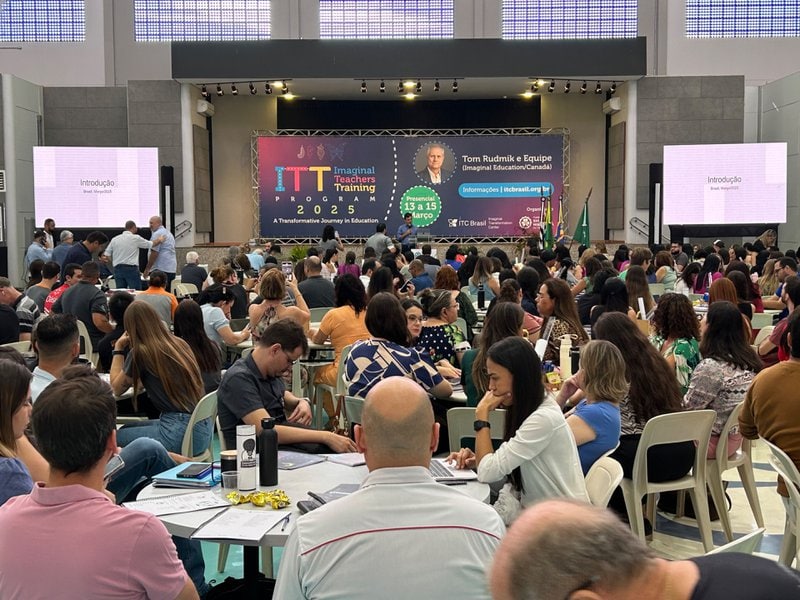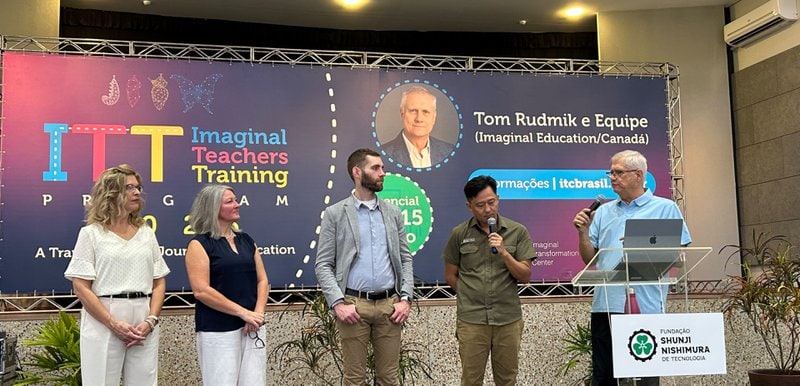It’s an average day in the life of the Master’s parent. You drop your child or children off at Master’s, the facade of pallid glass peaks contrasted with that red bricked wall and even more vibrant red painted door. On the surface, it appears to be just another school … But is it?
Profound Learning in Brazil
On this side of the northern hemisphere, here in Pompeia Brazil where I am sitting at my desk writing this article, it is not an average day at all—neither for Brazilians nor for you, our Master’s parents.
You see just down the gravel road from my hotel room tucked away here at the Nishimura Foundation estate is a conference (not our first) in which 300+ teachers, education leaders—even politicians—are taking part in a high-intensity 3-day training conference on Profound Learning facilitated by our very own Master’s Research and Development team, led by Tom Rudmik. And it’s not just Brazilians, but also representatives of the country of Paraguay.

Many have travelled a long distance to learn from our R&D team about the nine elements of Profound Learning, and how they can transform their classrooms, schools, and cities by enhancing the education of their students. You see, these participants, these educators, leaders, and government ministers, don’t see themselves as ordinary people, but rather as agents of change who are actively making a difference for the transformation of their beloved country of Brazil.
Mayor of Pompeia Preaches Imaginal Learning
One of the people to make an opening statement yesterday was the Mayor of Pompeia himself, Diogo Silva. Mayor Silva had just two days prior awarded Tom Rudmik honorary citizenship of the city of Pompeia at city hall.
Mayor Silva welcomed everyone to the conference, and explained how significant the conference is for the city of Pompeia, São Paulo state, and the country of Brazil. He went on to say “We want Imaginal Learning here in Pompeia,” to a cheery round of applause.
After the opening remarks, and as the conference got underway, Mayor Silva was kind enough to lend me a few minutes of his time for a short interview outside of the conference centre—a sleek modernist gymnasium that is part of the Nishimura school–amidst throngs of palm trees and a slight summer breeze cooling us from the hot Brazilian sun.

“Selecting our city of Pompeia to host this event is a big honour,” Mayor Silva explained after I had asked him about his vision for education here in this city of about 30,000. “It’s a big privilege, not only for education, but our entire community.”
He continued,
“The public and private schools are here together, talking with each other about the Profound Learning methodology … And today is a very very important day too because we are going as municipal schools, municipal education, and we are taking our first step to implement the Imaginal Learning methodology in our school network, in the [school] system of Pompeia.”
The result of this conference, which is only going to grow throughout this country and into other South American countries, has emerged after years of relationship and partnership between Tom Rudmik and a Brazilian agribusiness, owned and operated by a multi-generation family called the Nishimuras.
The Train Ride that Changed the World
The patriarch of the Nishimura family, Shunji Nishimura, came to Brazil from Japan with his wife during WWII. When they arrived at São Paulo, they decided to take the train as far as it would go and settle there—that place was a very small rural town called Pompeia. (The train station where they completed their migration is where I had lunch today—one of my favourite places to eat in Pompeia—converted into a very fine but laid back Brazilian BBQ operation. Ironically, it is typically flooded at lunch time by employees of the Nishimuras.)

To make a living, Shunji Nishimura put a sign up on a little shack that read, ‘Will fix anything’. Over time people started coming, then more people started coming. After a while Shunji heard more and more about the farmers’ problems in the field, and started creating solutions.
One significant invention was the hand-held sprayer that became a hot item among farmers in the region. As the operation grew, Shunji’s little ‘fix it’ shop became the company called Jacto. Another significant invention was the first ever coffee harvesting machine. Shunji’s coffee harvesting machine, and the models and developments that came out of it, is the reason why to this day Brazil is one of the largest producers of coffee in the world.
With the growing success of Jacto, Shunji wanted to invest in education. “We must always sow more growth,” he was known for saying. He saw education as sowing the next generation. He started several schools and a foundation to support them. And ever since, the Nishimuras have been growing their business, growing their foundation, and growing their reach in Brazil.
We Must Always Sow More Growth
Shunji handed down the company, one by one, to his sons. When the youngest, Jorge, became Chair of the company, he had already started another education project: the University of the Family. The University of the Family to this day delivers training and resources to families all over Brazil, teaching them about Jesus Christ, the Bible, and the Christian faith, marriage and family, and finance. They have educated over 1 million families across Brazil.

One day Jorge and his wife Marcia attended a conference in Denver for Christian leaders. A man stepped up to the podium with a passionate message on education and transformation and a blazing new book. His name was Tom Rudmik, and his book was called Becoming Imaginal. Jorge was greatly inspired by Tom’s talk. After the session, Jorge and Marcia introduced themselves to Tom, and thus began a great personal and working relationship. Jorge brought a cohort of Brazilians in sub-sub-zero temperatures to Master’s in March 2014. Soon after, Tom began working closely with the other brothers and the Nishimura family helping them embrace innovation, to become more open with ideas, to become imaginal.
Rudmik Innovation Centre Unveiled in Brazil
The work has grown over the last 11 years as Master’s, Jacto, and the Nishimura Foundation have formed a very productive partnership. The Nishimuras built a new school—a prototype school for Imaginal Learning—that includes a great gift and surprise for Tom: The Rudmik Innovation Centre.
Now people from all over South America don’t have to travel to Master’s to see Imaginal Learning in action—they simply go to Brazil, to the Nishimuras.

Jacto recently opened a new manufacturing facility, fully automated, and covering over one million square feet. And the education initiative is growing strong. They have invested into our R&D initiatives at Master’s, and we have invested into the growth of their company and the foundation, and have built close relationships with the family.
One of Jorge’s gifts is what he calls ‘multiplication’. He’s always told Tom:
“Tom, one day you will see: Imaginal Learning will spread all over Brazil and across South America. I have the multiplication system.”
Mayor Silva …
“And with this next step, of implementing Imaginal Learning … doing that, doing great, improving year after year, we are confident that we can spread this model for other small cities, their neighbouring cities, and throughout São Paulo state.”
There is such a thirst for Imaginal Learning here. Living in a developing country, parents are eager to give their children the best education possible—but the quality isn’t there. Stuck in old traditional ways that do not foster creativity and the uniqueness of each student, schools here are stagnant and children unmotivated.
The Revolution in Maracajaú
About a year ago, Imaginal Learning started spreading to another part of Brazil called Maracajaú: a beach community in the city of Maxaranguape in the state of Rio Grande do Norte. The spread has been inspired largely by a highly influential pastor’s wife who has literally knocked on the doors of other educators and politicians advocating for Imaginal Learning to become the educational model for Maracajaú. And from what I’ve heard, she did not take ‘no’ for an answer.

Now, we have the Secretary of Education for Maracajaú here with us. She’s a believer.
She’s a believer because the prototype school for Imaginal Learning this year—a rural public school in the town of Maracajaú that includes special needs students—has gone from one of the worst schools in the region to the second-best performing school in the rankings.
A number of teachers from Maracajaú stood up front and absolutely gushed about Imaginal Learning—they all stood there and beamed. One was excited about the impact Profound Learning is having on special needs students—they love it. And another talked about how teachers are taking less sick days—they are feeling overall healthier, less depressed and anxious, and are feeling motivated. And another remarked that in the past when it rained, the children would not come to school. But now, rain or shine children do not want to miss a single day. They have started to build an Imaginal Transformation team in Maracajaú, and now they are working with the Ministry of Education, and it is beginning to grow to other schools.
Mayor Silva …
I talked for about five minutes with the Maracajaú Secretary of Education, and she has invited me to meet her and to see in person how the methodology works in their schools.
The Ecosystem for Transformation
Since stepping down as Chair of Jacto and the family foundation, Jorge has been working hard to transform Pompeia into a city of the future. Given that Jacto employs about 40% of the city, Jorge feels he has a responsibility to the city, to the place that created so much opportunity for his father Shunji, and now the third generation leadership. His initiative is called “Obrigado Brazil!’ (Thank you Brazil!)
And Jacto isn’t slowing down either. The company is growing an ecosystem that consists of business, education, health care, social improvement, and urban development. One of our partners who’s heading up the Imaginal Transformation Centre Brazil (the sponsor of the teachers conference) told us that they are building the Silicone Valley of Brazil.
The little city that could—and Master’s is right in the heart of it …
I asked Mayor Silva what he thought of the Nishimura’s vision for the city of Pompeia—to build, in Jorge’s words, ”The best little city in Brazil” …
“I have a lot of respect for Jorge and all the Nishimura family, and all the ecosystem that’s around him, not just Jacto, but the Foundation and the Institute about this agenda to the next 15 years … So Jorge has a social vision. I have a development, economic vision. And so combining the social with the economic we can get there—soon.”

It’s the end of day two of the conference, and since opening day other opportunities have emerged. A medical school wants to work with us to develop a program for up and coming doctors. The new students come to medical school young and vibrant and full of life and energy; but the system drags them down, burdens them, and sucks the life out of them. These professors want to work with us to create a place that fosters imagination, creativity, and overall well-being, which is just what we have been working on over the past 25 years in R&D.
Mayor Silva is planning his trip to Master’s—he’s excited to see Profound Learning at its very heart. Once again a Brazilian delegation stretches out beyond the southern hemisphere, drawn by Profound Learning.
Tonight at dinner Jorge said, “Tom: this might be the time when it begins to rain. We need to be ready.”
So the next time you drop off or pick up your child, I hope you will see us a little differently. That you will begin to see us as the prototype school for local and global transformation in education. That you would see how your school is making an impact on countries around the world. We’re working hard behind the scenes. And the Advancement team and I are continuing to find ways to open wide the laboratory door and give you a good look inside.
